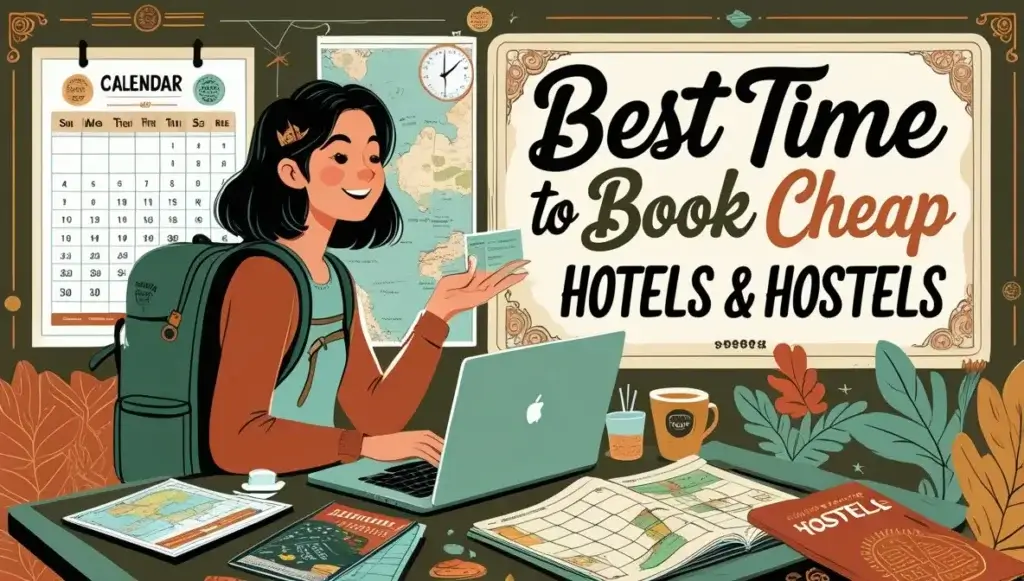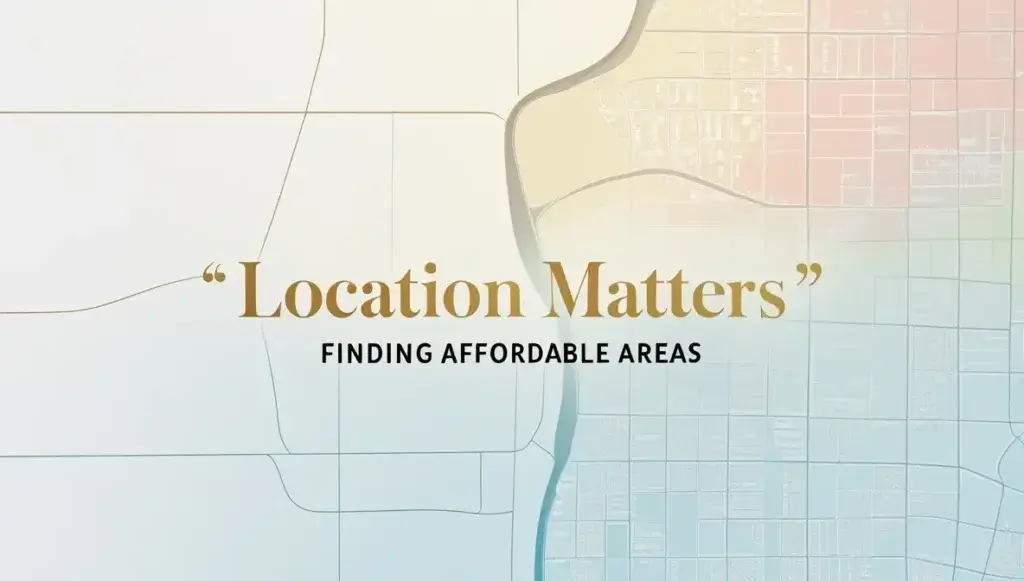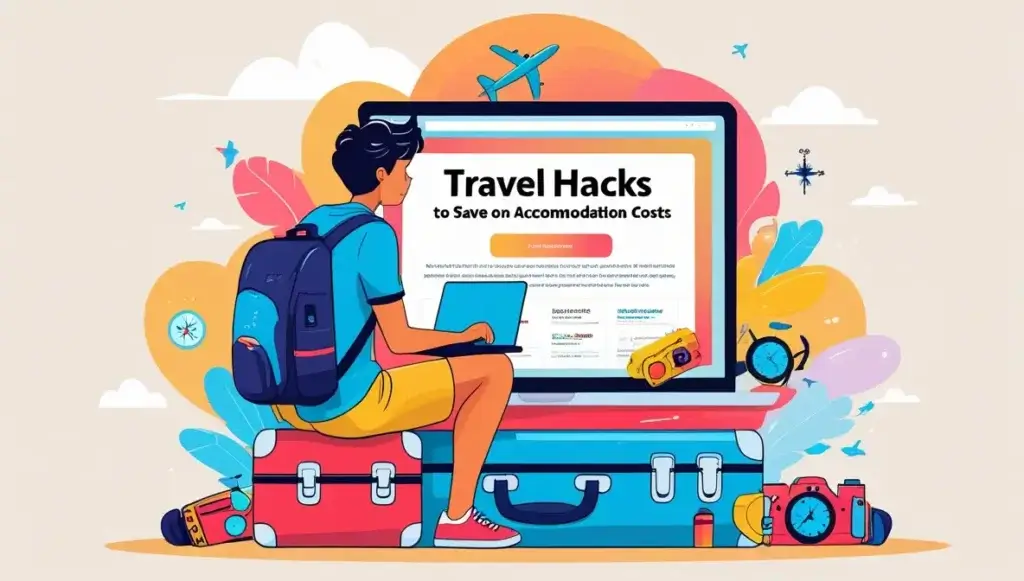Introduction
How to Find Cheap Hotels and Hostels is a crucial skill for any budget-conscious traveler. Accommodation often takes up a significant portion of travel expenses, but saving on lodging doesn’t mean compromising on comfort or convenience. By learning how to secure affordable stays, you can stretch your travel budget further and focus on enjoying your trip to the fullest.
Importance of Finding Budget Accommodation
Saving money on lodging is essential because it allows travelers to allocate their funds toward more memorable experiences, such as exploring local attractions, indulging in unique cuisines, or participating in cultural activities. Affordable accommodations provide practical and comfortable options that meet your needs without unnecessary expenses.
Benefits of Saving Money on Lodging
- More funds for experiences: Spend more on activities and adventures.
- Extended trips: Stay longer or visit additional destinations.
- Reduced overall costs: Many budget accommodations include perks like free breakfast or Wi-Fi, cutting down extra expenses.
Who Needs Cheap Hotels & Hostels?
Budget accommodations are ideal for:
- Backpackers and solo travelers: Prioritize affordability and social opportunities.
- Students and young adventurers: Seek economical options with safety and convenience.
- Families on a budget: Look for family-friendly spaces with multiple beds or amenities.
- Long-term travelers and digital nomads: Need affordable stays with practical amenities like Wi-Fi and kitchens.
Learning how to find cheap hotels and hostels ensures that you can travel smarter, save money, and make the most of your journey.
Understanding Your Budget

Setting a Realistic Travel Budget
Before booking accommodations, it’s essential to establish a realistic travel budget. Start by determining your total trip expenses, including transportation, food, activities, and lodging. A good rule of thumb is to allocate a specific portion of your budget to accommodations based on your priorities. For example:
- If you value comfort and convenience, you might dedicate a larger share to hotels.
- If you prefer to save on lodging and spend more on experiences, hostels or budget options are ideal.
To stay on track, use budgeting tools or apps to monitor your spending and ensure that accommodation costs fit within your overall financial plan.
How Much Should You Spend on Accommodation?
The percentage of your travel budget spent on lodging typically depends on your travel style and destination:
- Budget travelers: Allocate around 20–30% of the total trip budget to accommodations.
- Mid-range travelers: Spend closer to 30–40% for more comfortable stays.
- Luxury travelers: May dedicate 50% or more to high-end accommodations.
For example, if your total travel budget is $1,000, a budget traveler might spend $200–$300 on lodging, while a mid-range traveler might allocate $300–$400.
Factors That Influence Accommodation Prices
Several factors can impact the cost of hotels and hostels. Understanding these can help you plan better and find deals:
- Location: Accommodations in city centers or near tourist attractions are often more expensive than those in suburban or less popular areas.
- Seasonality: Prices tend to spike during peak travel seasons (e.g., summer or holidays) and drop during off-seasons.
- Amenities: Properties with added features like pools, gyms, or free breakfast often charge higher rates. Consider which amenities are essential for your stay.
- Booking Methods: Booking through online travel agencies (OTAs), directly with the property, or using last-minute deal platforms can all yield different price points. Flexibility in booking dates can also lead to better deals.
By understanding these factors and setting a clear budget, travelers can make informed decisions that balance affordability with comfort and convenience.
Choosing Between Hotels and Hostels

Pros and Cons of Hotels vs. Hostels
| Feature | Hostels | Hotels |
| Cost | Most affordable, especially in shared dorms. Private rooms are cheaper than hotels but more expensive than dorms. | Rates vary widely, with budget hotels comparable to private hostel rooms. Luxury hotels are significantly more expensive. |
| Privacy | Shared dorms offer minimal privacy, but private rooms provide a middle ground. Communal spaces encourage socializing. | Private rooms guarantee privacy, with soundproofing and individual bathrooms for added comfort. |
| Amenities | Basic amenities like shared kitchens and laundry rooms. Some hostels may offer pools or free breakfast. | Extensive amenities such as spas, gyms, pools, room service, and premium toiletries. |
| Social Atmosphere | Highly social, with communal spaces and organized activities like pub crawls or group tours. Ideal for meeting fellow travelers. | Less social; interactions are primarily with staff. Better suited for quiet retreats or romantic getaways. |
| Sleep Quality | Dorms can be noisy and crowded; private rooms are quieter but still subject to outside noise. | Higher-end hotels offer soundproof rooms and premium bedding for better sleep quality. |
When to Choose a Hotel Over a Hostel
Hotels are a better choice in scenarios where privacy, comfort, or specific amenities are essential:
- Business Trips: Hotels provide quiet spaces, work desks, and professional services like concierge assistance.
- Family Vacations: Families often prefer hotels for private rooms, child-friendly amenities, and convenience.
- Romantic Getaways: Couples seeking a peaceful retreat or luxury experience benefit from private rooms and enhanced services.
- Special Occasions: Hotels are ideal for events like weddings or anniversaries due to their formal atmosphere and event facilities.
Best for Solo Travelers, Couples, and Families
- Solo Travelers: Hostels are perfect for solo adventurers looking to meet new people through communal spaces and group activities. However, private hostel rooms or budget hotels might suit those who prefer solitude.
- Couples: Hotels typically offer the privacy and comfort couples desire on romantic trips. Boutique hotels can provide a unique local experience while maintaining intimacy.
- Families: Hotels cater well to families with spacious rooms, child-friendly amenities, and convenient locations near attractions. Hostels may work for families on tight budgets if private rooms are available.
Ultimately, the decision between hotels and hostels depends on individual preferences regarding budget, privacy needs, social opportunities, and the purpose of the trip.
Best Online Platforms for Finding Cheap Hotels

Overview of Booking Websites
Several online platforms make it easy to find affordable hotels and hostels. Here are some of the top options:
- Booking.com: A versatile platform offering everything from budget hostels to luxury hotels. Its Genius Loyalty Program provides discounts, free upgrades, and perks like complimentary breakfast for frequent users.
- Expedia: Specializes in hostels, making it ideal for backpackers and solo travelers. It features extensive reviews and ratings to help users choose the best option.
- Agoda: Known for its strong presence in Asia, Agoda offers competitive prices on hotels and hostels worldwide. Its AgodaVIP program provides discounts of up to 25%, while AgodaCash allows users to earn points for future bookings.
- Priceline: Offers unique features like Express Deals and Pricebreakers, where users can save by booking “mystery” hotels.
These platforms cater to different needs, whether you’re looking for budget-friendly dorms or mid-range hotels.
Using Price Comparison Tools
Metasearch engines are invaluable for comparing prices across multiple booking sites:
- Kayak: Aggregates prices from various OTAs and offers tools like price alerts and fare predictions.
- Momondo: A user-friendly platform that displays prices from multiple websites, helping you find the best deal without booking directly on the site.
- Trivago: Compares rates from over 400 platforms, allowing users to filter by price, star rating, or location. It also provides price alerts for cost changes.
These tools save time by consolidating options, ensuring you don’t miss out on better deals elsewhere.
Benefits of Direct Booking vs. Third-Party Sites
While OTAs often provide competitive prices, direct booking with hotels has its own advantages:
- Exclusive Deals and Perks:
- Hotels frequently offer lower rates or special packages when you book directly. Perks may include free breakfast, room upgrades, or flexible check-in/out times.
- Loyalty Programs:
- Direct bookings often allow you to earn hotel-specific loyalty points, which can be redeemed for discounts or free stays in the future.
- Personalized Service:
- Booking directly enables better communication with hotel staff, allowing them to accommodate special requests or tailor your stay to your preferences.
- Transparent Pricing:
- Direct bookings avoid hidden fees that sometimes appear on third-party sites, providing a clearer picture of the total cost.
While OTAs are excellent for price comparisons and convenience, direct booking can enhance the overall experience with added value and personalized service.
Booking Strategies to Save Money

Booking in Advance vs. Last-Minute Deals
Both early booking and last-minute deals have their advantages, depending on your travel style and priorities:
- Early Booking:
- Advantages: Securing promotional fares, locking in lower rates, and having access to a wider range of options for rooms and amenities. This is particularly beneficial during peak seasons or for group trips.
- Disadvantages: Requires commitment, with potential cancellation fees and higher upfront costs.
- Last-Minute Deals:
- Advantages: Offers deep discounts on unsold inventory, especially during off-peak times. Ideal for flexible travelers who can adapt quickly.
- Disadvantages: Limited availability and fewer choices, especially during high-demand periods. It can also be stressful to make quick decisions.
For the best savings, consider blending both approaches—book essentials early but stay open to last-minute opportunities for additional savings.
Using Discounts, Promo Codes, and Loyalty Programs
Maximizing discounts and loyalty programs can significantly reduce accommodation costs:
- Promo Codes: Many hotels offer exclusive discounts through promo codes shared via newsletters or social media. These codes can unlock special rates for specific rooms or dates.
- Loyalty Programs: Joining hotel loyalty programs like Hilton Honors or Marriott Bonvoy provides perks such as discounted rates, free upgrades, and reward points that can be redeemed for future stays.
- Third-Party Discounts: Platforms like Rakuten or TopCashBack allow users to earn cashback on hotel bookings, adding an extra layer of savings.
By combining promo codes with loyalty programs, travelers can save more while enjoying added benefits.
Flexible Dates for Better Prices
Flexibility in travel dates is one of the most effective ways to save money:
- Hotels often adjust rates based on demand; traveling during off-peak seasons or weekdays typically results in lower prices.
- Many booking platforms feature calendars that display fluctuating rates by date, allowing travelers to choose the most budget-friendly options.
- Avoid checking in on Fridays (often the most expensive day) and consider Sunday check-ins for cheaper rates.
Being flexible not only reduces costs but also opens up opportunities for better accommodations at lower prices.
Alternative Accommodation Options
Couchsurfing and Homestays
- Couchsurfing: This platform connects travelers with locals who offer free accommodation, often in exchange for cultural exchange or companionship. It’s a great way to save money while immersing yourself in local culture. Couchsurfing hosts often provide insider tips about hidden gems and off-the-beaten-path attractions, making it an enriching experience beyond just saving on lodging. However, comfort levels can vary, as accommodations range from couches to spare rooms.
- Homestays: While not free, homestays are a budget-friendly option that allows travelers to stay with local families. Platforms like Homestay.com or even Airbnb offer listings where you can enjoy authentic cultural experiences, home-cooked meals, and personalized recommendations from your hosts. Homestays are especially ideal for first-time visitors to a destination who want a deeper connection with the local community.
Airbnb vs. Hotels vs. Hostels
- Cost:
- Airbnb private rooms or shared spaces are generally cheaper than hotels but more expensive than hostels.
- Hostels offer the most budget-friendly rates, especially for dormitory-style accommodations.
- Hotels provide consistent pricing but are typically the most expensive option unless booked during promotions or off-seasons.
- Privacy:
- Airbnb offers more privacy, especially when renting an entire property.
- Hostels are communal by nature, with shared dorms and facilities, though private rooms in hostels are available at higher rates.
- Hotels guarantee privacy and comfort but lack the social atmosphere of hostels.
- Amenities:
- Hostels provide basic amenities like communal kitchens and social spaces, often organizing events for guests.
- Airbnb properties vary widely but often include home-like amenities such as full kitchens and laundry facilities.
- Hotels offer premium amenities like pools, gyms, and room service but at a higher cost.
House-Sitting and Work Exchanges
- House-Sitting: Platforms like Trusted Housesitters allow travelers to stay in someone’s home for free in exchange for taking care of pets or maintaining the property. House-sitting is ideal for those seeking quiet stays in residential areas and can include perks like staying in luxurious homes or scenic locations. However, it requires flexibility in travel dates and destinations.
- Work Exchanges: Programs like Workaway, WWOOF, and Worldpackers connect travelers with hosts who provide free accommodation (and sometimes meals) in exchange for a few hours of work per day. Tasks can range from farming to teaching English or helping at hostels. This option is perfect for those looking to immerse themselves in local cultures while learning new skills.
By exploring these alternative accommodations—whether through cultural exchanges like Couchsurfing or practical arrangements like house-sitting—you can significantly reduce your travel costs while enjoying unique and memorable experiences.
Best Time to Book Cheap Hotels & Hostels

How Seasonality Affects Pricing
Seasonality plays a significant role in hotel and hostel pricing, as rates fluctuate based on demand:
- Peak Season: During high-demand periods, such as summer vacations, holidays, or major local events, prices for accommodations can skyrocket. For example, ski resorts in winter or beach destinations in summer often see steep price increases due to limited availability and high demand.
- Off-Season: In contrast, off-peak months—typically fall and winter for many destinations—offer significantly lower prices. Hotels and hostels reduce rates to attract guests during these quieter times, making it an excellent opportunity for budget-conscious travelers to save money.
- Shoulder Season: This is the period between peak and off-season. It combines the benefits of lower prices with favorable weather and fewer crowds. For instance, spring and early autumn are ideal for destinations like Europe or mountain retreats.
By aligning your travel plans with off-season or shoulder season periods, you can take advantage of reduced rates while enjoying a more relaxed atmosphere.
Best Days of the Week to Book
The day of the week you book your accommodation can also impact the price:
- Cheapest Days to Book: Sundays and Mondays are often the most affordable days to book hotels. This is because weekend travelers have checked out, leaving hotels with surplus inventory they need to fill.
- Midweek Stays: Staying midweek (e.g., Tuesday through Thursday) is typically cheaper than weekends when leisure travelers drive up demand. Business-centric cities particularly see lower midweek rates as business travelers leave.
- Last-Minute Deals: Booking closer to your travel date can sometimes yield discounts for unsold rooms, especially on Wednesdays when hotels reassess their inventory for the upcoming weekend.
By targeting these specific days for booking and stays, you can maximize savings.
Off-Season vs. Peak Season Travel Tips
To make the most of seasonal pricing:
- Travel During Off-Season:
- Enjoy significant discounts on accommodations, flights, and activities.
- Avoid large crowds at popular attractions.
- Be mindful of potential downsides like limited services or less favorable weather conditions.
- Travel During Peak Season:
- Book accommodations well in advance to secure competitive rates.
- Consider alternative lodging options like boutique hotels or vacation rentals to avoid inflated prices at mainstream hotels.
- Start your day early to beat crowds at popular attractions.
By understanding how seasonality impacts pricing and strategically planning your travel dates and bookings, you can save money while enjoying a more rewarding travel experience.
Location Matters: Finding Affordable Areas

Staying Outside City Centers to Save Money
Accommodations in city centers are often significantly more expensive compared to those located in suburban or less central areas. By staying just a little further out, travelers can save up to 50% on lodging costs while still enjoying comfortable amenities. For example, suburban guesthouses or budget hotels often provide perks like free Wi-Fi, shared kitchens, and larger spaces at a fraction of the cost of downtown options. Additionally, staying outside tourist hotspots can offer a more authentic experience, allowing travelers to explore quieter neighborhoods and discover hidden gems.
Public Transportation Access and Convenience
When booking accommodations outside the city center, proximity to public transportation is crucial. Well-connected transit systems, such as buses, trains, or metro lines, make it easy and affordable to access major attractions without relying on expensive taxis or car rentals. Public transit not only reduces travel costs but also provides an opportunity to experience the destination like a local. Travelers should prioritize accommodations near transit hubs or shuttle services provided by hotels for added convenience.
Safe but Budget-Friendly Neighborhoods
Finding affordable yet secure neighborhoods is essential for a worry-free stay. Researching crime rates and reading reviews can help identify safe areas that fit your budget. For instance:
- Suburban Areas: These often have lower accommodation costs and quieter environments while maintaining safety and accessibility.
- Local Recommendations: Platforms like Airbnb or guidebooks can highlight neighborhoods that balance affordability with security.
- Hidden Gems: Areas slightly removed from tourist zones often offer unique cultural experiences without the inflated prices of central locations.
By focusing on these factors—staying outside city centers, leveraging public transportation, and choosing safe neighborhoods—travelers can enjoy affordable accommodations without sacrificing convenience or peace of mind.
Negotiating for Better Deals
Calling Hotels Directly for Discounts
Negotiating rates over the phone can be an effective way to secure better deals. Here are some tips:
- Do Your Homework: Research prices on online travel agencies (OTAs) beforehand and mention them during the call. Hotels often pay commissions to OTAs, so they may offer lower rates if you book directly.
- Be Polite and Clear: Ask about availability for your desired dates and room type, then inquire if they can offer a discount for booking directly. Avoid being presumptuous; politeness goes a long way in negotiations.
- Target Off-Peak Times: Call during off-season or periods of low occupancy when hotels are more likely to negotiate rates to fill rooms.
- Request Alternatives: If a rate reduction isn’t possible, ask about complimentary upgrades, free breakfast, spa access, or other perks to enhance your stay without extra cost.
Asking for Free Upgrades or Extra Amenities
Securing complimentary upgrades or amenities can elevate your experience without additional expenses:
- Mention Special Occasions: Let the staff know if you’re celebrating a birthday, anniversary, or milestone. Hotels are often willing to provide upgrades as a gesture of goodwill.
- Travel During Quiet Periods: Upgrades are more likely during off-peak times when hotels have surplus inventory.
- Join Loyalty Programs: Membership in hotel loyalty programs increases your chances of upgrades, as repeat customers are often prioritized.
- Ask Nicely at Check-In: A friendly and polite request at the reception can sometimes result in an upgrade. Highlighting issues with your current room (if valid) may also prompt staff to offer better options.
Group Booking Discounts
Traveling in groups offers unique opportunities for negotiating discounts:
- Book Early: Planning group bookings well in advance gives hotels time to customize offers and secure lower rates.
- Negotiate Directly with Management: Communicate directly with hotel sales teams or managers to discuss group rates. They are often willing to offer discounts for large bookings or extended stays.
- Leverage Group Perks: Group bookings can include additional benefits like complimentary meals, meeting rooms, or bundled services. Be specific about your group’s needs when negotiating.
- Use Specialized Platforms: Platforms like Engine help secure discounts of up to 60% for group bookings and streamline the negotiation process.
By combining direct communication, politeness, and strategic timing, travelers can negotiate better deals, secure upgrades, and enjoy added perks while saving money on accommodations.
Reading Reviews and Avoiding Scams
How to Spot Fake Reviews
Identifying fake reviews is essential to ensure you’re booking a legitimate and quality accommodation. Here are some tips to help you spot them:
- Look for Balanced Feedback: Genuine reviews often provide both positive and negative aspects of the stay. Reviews that are overly glowing or excessively critical without specifics may be fake.
- Check Reviewer Profiles: Be cautious of reviewers with no profile picture, limited review history, or multiple reviews posted in a short time across different properties. This could indicate fake accounts.
- Analyze Language and Details: Fake reviews often use generic phrases like “best experience ever” or “worst stay ever” without specifics. Genuine reviews typically mention details such as staff names, room features, or unique experiences.
- Watch for Patterns: A sudden surge of positive or negative reviews within a short timeframe might indicate manipulation. Cross-check reviews on multiple platforms for consistency.
- Verify Photos: If reviews include photos, use reverse image search tools to ensure they aren’t stock images or reused across different listings.
Checking Safety Ratings and Hygiene Standards
Prioritizing safety and cleanliness is critical when choosing accommodations:
- Read Reviews on Cleanliness: Look for mentions of clean rooms, fresh linens, and well-maintained facilities. Guest satisfaction often correlates with hygiene standards.
- Check for Hygiene Certifications: Many hotels now display certifications or badges indicating compliance with health and safety protocols, especially post-pandemic.
- Focus on High-Touch Areas: Reviews that highlight the cleanliness of high-touch areas like door handles, bathrooms, and communal spaces can provide insight into the property’s standards.
- Inspect Photos Carefully: Look for signs of cleanliness (tidy rooms, spotless bathrooms) in guest-uploaded photos rather than relying solely on professional images from the hotel.
Red Flags to Watch Out For
Be alert to these common signs of scams or misleading listings:
- Too-Good-To-Be-True Prices: Unusually low rates could indicate non-existent properties or hidden fees. Always verify prices across multiple platforms.
- Vague Listings: Listings that lack specific details about location, amenities, or policies may be fraudulent. Avoid properties with unclear cancellation policies or hidden fees.
- Suspicious Photos: Overly polished images that don’t match the description could be stock photos. Use reverse image search tools to confirm authenticity.
- Multiple Listings with Different Prices: If the same property appears under different names or prices on various platforms, it may be a scam intended to double-book guests.
- Strange Payment Requests: Be wary if asked to pay via unconventional methods (e.g., wire transfers) or if redirected to third-party payment systems outside trusted platforms like Booking.com or Airbnb.
By carefully analyzing reviews, prioritizing safety standards, and staying alert for red flags, you can avoid scams and ensure a safe and enjoyable stay.
Packing Tips for Hostel Stays

Must-Have Items for Hostel Stays
Packing the right essentials can make your hostel experience more comfortable, secure, and enjoyable. Here are some must-have items for a smooth stay:
- Padlocks: A sturdy padlock (preferably combination-style) is essential for securing your belongings in lockers or your luggage if lockers aren’t available.
- Earplugs and Eye Mask: These are crucial for blocking out noise and light in shared dorms, ensuring better sleep despite roommates’ schedules.
- Microfiber Towel: Compact, lightweight, and quick-drying towels are ideal for hostels where towels are often not provided.
- Flip-Flops: Essential for shared showers to maintain hygiene and comfort.
- Toiletries: Pack travel-sized shampoo, soap, deodorant, toothpaste, and a toothbrush. Consider solid toiletries to save space and avoid spills.
- Universal Travel Adapter and Power Bank: A multi-port adapter ensures you can charge devices in any country, while a power bank keeps your electronics charged on the go.
- Reusable Water Bottle: Preferably one with a filter to save money and reduce plastic waste during your travels.
Dormitory vs. Private Rooms in Hostels
Hostels offer both dormitory-style rooms and private rooms, each with distinct advantages depending on your preferences and budget:
| Feature | Dormitory Rooms | Private Rooms |
| Cost | Most affordable option; ideal for budget travelers. | More expensive but still cheaper than hotels. |
| Privacy | Minimal privacy; shared sleeping spaces with other guests. | Offers personal space with lockable doors. |
| Social Atmosphere | Great for meeting fellow travelers and networking. | Limited social interaction but access to common areas. |
| Amenities | Shared bathrooms and facilities; may lack en-suite options. | Often includes en-suite bathrooms or extra amenities like desks or TVs. |
Dorms are best for solo travelers looking to save money and socialize, while private rooms suit couples or those seeking more privacy without sacrificing the hostel vibe.
Safety and Privacy in Shared Accommodations
Staying safe in a shared environment requires some preparation. Here’s how to protect your belongings and maintain privacy:
- Use Lockers: Most hostels provide lockers for valuables. Always bring a padlock or cable lock to secure your items effectively.
- Keep Essentials Close: Store passports, credit cards, and electronics in a small pouch or money belt that you can keep under your pillow or on your person while sleeping.
- Choose Hostels with Good Reviews: Research hostels with positive feedback on safety measures like 24/7 reception, secure entry systems, or individual lockers.
- Be Cautious in Common Areas: Avoid leaving valuables unattended in shared spaces like lounges or kitchens. Stay vigilant when using communal charging stations.
- Privacy Curtains: Opt for hostels that provide bed curtains or dividers for added personal space in dorms.
By packing thoughtfully, choosing the right room type, and taking precautions to secure your belongings, you can enjoy a safe and comfortable hostel experience.
Travel Hacks to Save on Accommodation Costs

Using Credit Card Points and Miles
Credit card rewards programs can significantly offset the cost of accommodations, making them a valuable tool for budget-conscious travelers:
- Earning Points: Many travel credit cards allow you to earn points or miles on everyday purchases, which can later be redeemed for hotel stays. Some cards even offer bonus points for spending in travel-related categories like dining or transportation.
- Redeeming Points: Points can be redeemed directly through credit card travel portals (e.g., Chase Ultimate Rewards) or transferred to hotel loyalty programs like Marriott Bonvoy or Hilton Honors for added flexibility. This often unlocks perks like free nights, room upgrades, or exclusive discounts.
- Sign-Up Bonuses: Many travel cards offer lucrative sign-up bonuses that can cover multiple nights at hotels if you meet the minimum spending requirement within the first few months.
- Extra Perks: Some cards provide additional benefits such as complimentary nights, late checkouts, or access to airport lounges when booking partner hotels.
By strategically using credit card rewards, you can reduce or even eliminate accommodation costs during your travels.
Volunteering for Free Stays
Volunteering abroad is another excellent way to save on accommodation while immersing yourself in local cultures:
- Workaway: This platform connects travelers with hosts who offer free lodging in exchange for work. Tasks may include helping at hostels, teaching languages, or assisting with farming projects.
- WWOOFing: The Worldwide Opportunities on Organic Farms (WWOOF) program allows travelers to work on organic farms in exchange for free room and board. This is ideal for those seeking a hands-on experience in rural settings while saving money.
- Worldpackers: Similar to Workaway, Worldpackers offers opportunities to volunteer at hostels, eco-projects, and community initiatives worldwide. It includes a support system to ensure safe and fair exchanges.
These programs not only save money but also provide unique opportunities to connect with locals and learn new skills.
Split Stays—Mixing Cheap and Mid-Range Options
Split stays involve dividing your trip between different types of accommodations to balance cost and comfort:
- Start Budget-Friendly: Begin your trip with affordable options like hostels or budget hotels. This helps save money upfront while still enjoying basic amenities.
- End with a Splurge: Conclude your trip at a mid-range or luxury hotel for a more relaxing experience. Ending on a high note can make the trip feel more memorable without overspending throughout.
- Strategic Location Changes: Use split stays to stay closer to different attractions during various parts of your trip. For example, stay near city centers for sightseeing and move to quieter, less expensive areas later.
- Tips for Smooth Transitions: Pack light to make switching between accommodations easier, and plan “transition days” around activities so you’re not wasting time during check-in hours.
By combining budget-friendly options with occasional splurges, split stays allow you to enjoy diverse experiences while keeping overall costs manageable.
Conclusion
Recap of Best Tips
Throughout this guide, we’ve explored numerous strategies to find cheap hotels and hostels without sacrificing quality or comfort:
- Utilize online booking platforms and price comparison tools effectively.
- Be flexible with travel dates and locations to take advantage of off-peak pricing.
- Consider alternative accommodation options like hostels, Airbnb, or even volunteering opportunities.
- Leverage credit card rewards and loyalty programs to offset costs.
- Negotiate directly with hotels for better rates or added perks.
- Read reviews carefully to ensure you’re getting good value and avoiding scams.
- Pack smartly for hostel stays to maximize comfort and security.
- Mix budget accommodations with occasional splurges for a balanced travel experience.
Encouragement to Explore Budget Travel Options
Don’t let concerns about accommodation costs hold you back from exploring the world. Budget travel doesn’t mean compromising on quality or memorable experiences. By implementing the strategies discussed, you can find comfortable, safe, and affordable places to stay that align with your travel style and budget. Remember, some of the most authentic and enriching travel experiences often come from stepping out of your comfort zone and embracing diverse accommodation options.
Final Thoughts on Enhancing Travel Experiences
Saving on accommodations does more than just reduce your travel expenses—it opens up a world of possibilities. By cutting costs on where you sleep, you free up resources to:
- Extend your trip duration
- Indulge in local cuisines and cultural experiences
- Participate in unique activities or tours
- Visit more destinations within a single trip
Moreover, budget-friendly accommodations often lead to more authentic interactions with locals and fellow travelers, enriching your journey with diverse perspectives and unexpected friendships.
Ultimately, smart accommodation choices allow you to focus on what truly matters—the experiences, memories, and personal growth that come from exploring new places. By mastering the art of finding affordable yet comfortable places to stay, you’re not just saving money; you’re investing in richer, more frequent, and more meaningful travel experiences.
FAQs
What are the safest cheap accommodation options?
The safest cheap accommodation options include well-reviewed hostels, reputable budget hotels, and verified homestays. Look for places with security features such as lockers, 24/7 reception, and positive reviews regarding safety. Websites like Hostelworld and Booking.com often provide insights into the safety measures of listed accommodations.
How can I get last-minute deals on hotels?
To secure last-minute hotel deals, consider using apps and websites that specialize in last-minute bookings, such as HotelTonight or Priceline. Additionally, checking aggregator sites like Kayak or Google Hotels can help you compare prices quickly. Flexibility with your travel dates and being open to various locations can also lead to significant savings.
Are hostels safe for solo travelers?
Yes, hostels are generally safe for solo travelers. Many hostels implement security measures such as keycard access, lockers for valuables, and staff presence in common areas. Additionally, female-only dorms are often available for those who prefer extra privacy. Checking reviews from previous guests can also provide insights into the safety of a specific hostel.
Is Airbnb cheaper than hotels?
On average, Airbnb tends to be cheaper than hotels. For instance, the global average daily rate for an Airbnb is around $114 compared to approximately $140 for a hotel room. However, costs can vary based on location, property type, and additional fees like cleaning charges. Always compare total costs before making a decision.
What’s the best way to avoid extra fees when booking a hotel?
To avoid extra fees when booking a hotel:
- Read the fine print: Check the terms and conditions for hidden charges.
- Ask about fees directly: Inquire about potential charges for amenities like Wi-Fi or parking before booking.
- Use comparison sites: These often display total prices including taxes and fees.
- Book directly with the hotel: This can sometimes provide better transparency regarding fees and may offer additional perks.

